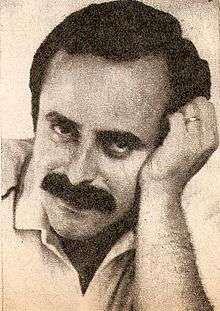Jorge Guinzburg
Jorge Ariel Guinzburg[2] (February 3, 1949 – March 12, 2008) was an Argentine journalist, theatrical producer, humorist, and TV and radio host.
Jorge Ariel Guinzburg | |
|---|---|
 | |
| Born | February 3, 1949 |
| Died | March 12, 2008 (aged 59) |
| Spouse(s) | Andrea Stivel |
| Awards |
|
Background
Guinzburg was born on February 3, 1949[3] to a Jewish family in Buenos Aires. He finished the high school in 1966, along with Carlos Abrevaya. In 1967, Guinzburg and Abrevaya entered the law school but they abandoned their college education soon afterwards. Later on, Guinzburg joined the drama school while he worked as a taxi driver.[4] In 1971, he became scriptwriter for Juan Carlos Mareco and some time later for the Fontana Show.
Career
Abrevaya and Guinzburg became members of Satiricón by 1972 and, according to writer Carlos Ulanovsky, both boys were funny, amiable and good natured.
In 1977, Guinzburg and Abrevaya started publishing a comic called Diógenes y el Linyera in Clarín, one of the most popular newspapers in Buenos Aires.
Guinzburg created more than twenty radio shows such as: El ventilador and Vitamina G. He worked for several advertising agencies and won several awards for his labor. He starred, directed and produced many theater plays. In TV, he wrote and hosted numerous comedy, news and game shows like Peor es nada, El Legado, La Biblia y el Calefón and Mañanas Informales.
Death
Guinzburg died in the Mater Dei clinic on March 12, 2008.[1] He was in the clinic six days before his death because he suffered the fracture of a vertebra. He was affected by a pulmonary disease (a pleural effusion and a pneumonia generated from a lung cancer). He was 59 at the time of his death. Guinzburg was buried at the Jewish Cemetery in La Tablada. His grave lays close to the grave of Jaime Barylko, who died in 2002.[5]
Family
His second wife Andrea Stivel is a TV producer and his daughter Malena Guinzburg is a stand-up comedian.
References
- "Murió Jorge Guinzburg" [Jorge Guinzburg died]. La Nación (in Spanish). March 12, 2008. Archived from the original on March 25, 2014.
- "Se despidió Mañanas informales". La Nación. December 19, 2008. Archived from the original on March 25, 2014.
- Lamazares, Silvina (March 13, 2008). "La última ironía". Clarín. Archived from the original on March 25, 2014.
- "Jorge Guinzburg, eterno: el homenaje del canal Volver". Clarín. September 9, 2019. Archived from the original on February 5, 2020. Retrieved February 5, 2020.
- "La triste despedida" [The sad goodbye] (in Spanish). Clarín. March 14, 2008. Archived from the original on February 5, 2020. Retrieved February 5, 2020.
| Wikimedia Commons has media related to Jorge Guinzburg. |